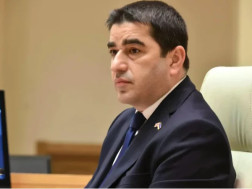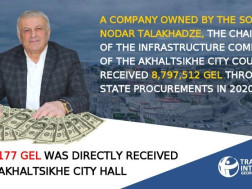Transparency International Georgia published a report on Anti-Corruption Environment in Georgia.
“The current situation vis-à-vis corruption in Georgia is characterized by impressively low levels of petty corruption combined with near total impunity for high-level corruption.
After the Rose Revolution in 2003, Georgia underwent a series of sweeping reforms that successfully curbed petty corruption in the previously graft-plagued public administration. They included a total overhaul of the tax system and the police force, creation of a one-stop-shop approach to the provision of government services, and the complete digitalization and opening up of public procurement.
These reforms were hailed individually as milestones worldwide. More importantly, they succeeded: process digitalization, automation and centralization dramatically reduced opportunities for bribe-taking, bringing petty corruption down to a minimum. This achievement has been maintained to this day – in annual surveys commissioned by TI Georgia over the past several years, the percentage of respondents reporting that they or a family member had been asked to pay a bribe for a public service has never exceeded 1%.
However, the last 18 years have not seen similarly ambitious reforms targeting high-level (so-called ‘elite’) corruption. As a result, both of the two administrations that have governed in this period have faced serious accusations of creating an environment of impunity for high-level corruption.
Of particular concern is that Georgia has seen a marked deterioration of its anti-corruption environment over the past several years, combined with a near total halt to efforts to carry out anti-corruption reformsThis is evidenced by the following:
There has been no significant improvement in Georgia’s score in the Corruption Perceptions Index since 2012. In its 2020 assessment, Transparency International highlighted “state capture and undue influence over key institutions as the main challenges to political integrity in Georgia”.
Georgia has made little progress in implementing international anti-corruption recommendations and commitments over the past four years. The national action plans developed by the Georgian government to implement the anti-corruption part of the Association Agenda have focused largely on organizing various types of training sessions, while failing to implement important aims, such as effective investigation of cases of high-level corruption and adoption of a law on freedom of information. In its latest report (2019), OECD ACN judged that Georgia had made no progress in implementing the majority of the 81 recommendations. Considerable shortcomings remain in terms of fulfillment of GRECO recommendations as well.
The National Anti-Corruption Strategy repeatedly fails to address the key challenge of high-level corruption, despite being regularly updated.
Key anti-corruption mechanisms have yet to be implemented in practice: (1) Whistle-blower protections exist only on paper; law enforcement agencies are effectively exempt from the relevant law. (2) There are no effective mechanisms to enforce conflict-of-interest and revolving-door provisions.
Public perceptions of the prevalence of and response to high-level corruption are very different from those relating to petty corruption: 63% of survey respondents believe that abuse of power by public officials is common or very common, and 47% are of the opinion that corruption cases involving high-ranking officials or ruling party associates are not investigated properly (29% believe that they are).
Recent years have seen increasing numbers of cases in which allegations of high-level corruption have failed to elicit any response from investigative bodies. As of March 2021, TI Georgia listed 50 un-investigated high-profile cases of corruption involving high-ranking public officials or persons associated with the party in power.
The only significant new element to be introduced into the country’s anti-corruption legislation since 2016 is the Law on Facilitating the Prevention of Money Laundering and the Financing of Terrorism (2019). Although a mechanism to monitor asset declarations by public officials went into operation in 2017, the process does not include any steps aimed at identifying conflicts of interest or illicit enrichment.
The basic explanation for this slowdown in anti-corruption reforms and the unwillingness to address high-level corruption lies in the political system in Georgia, which has allowed each subsequent government to concentrate all political power in its own hands. However, this state of affairs is currently rendered even more alarming by clear indications for the existence of informal power structures centring around the founder of the current ruling party, billionaire Bidzina Ivanishvili, that operate in parallel to democratic institutions. After analysing all available evidence for an influence by informal power structures on formal structures, TI Georgia has concluded that Georgia is experiencing state capture, which is the ultimate form of corruption for a democratic context.
Bidzina Ivanishvili is the founder of the current ruling party. The richest man in Georgia, he has an estimated worth of USD 5.5 billion, or about 30% of Georgia’s GDP though he prefers to use proxies and offshore companies to keep this wealth out of the public eye. While Ivanishvili’s 2012–2013 term as prime minister was the only time he has ever held public office, no one, including the ruling party officials, has ever made any secret of the fact that he has continued to play an active role in making major decisions, such as dismissal and appointment of prime ministers, since his resignation. In fact, the highest positions in key bodies of the executive branch in Georgia are filled by persons who are loyal to Ivanishvili or have worked for him in the past.
The two main agencies responsible for addressing corruption in Georgia can serve as examples here. The current head of the State Security Service has held top jobs in a number of Ivanishvili’s companies in the past; his predecessor had been Bidzina Ivanishvili’s personal chief of security. The current Prosecutor General also has ties to Ivanishvili, and his predecessor had previously acted as Ivanishvili’s personal attorney. Under such circumstances, it is impossible for existing anti-corruption agencies to combat high-level corruption free of political and undue influence.
While they realise that no single reform can address the sheer scale of the problem described above, TI Georgia and its partner organizations in Georgia believe that the reform with the largest potential to bring at least some results in combating corruption is the creation of an independent, multi-function anti-corruption agency tasked specifically with addressing high-level corruption. A legislative initiative to establish such an agency, prepared by TI Georgia, was introduced in Parliament in 2020. However, the convocation of the Parliament elected in the autumn of that same year refused to carry the proposal over for further consideration.
Recommendations to the European Union
The EU continues to be the gravitational centre for Georgian politics and society. Public opinion polls consistently show that the majority of the Georgian population remains in favour of closer ties with the EU. In its engagement with Georgia therefore, the EU should consider introducing conditionality on key anti-corruption reforms, such as the establishment of an independent anti-corruption agency and creation of a beneficial ownership registry, both of which are necessary preconditions for any future efforts to combat high-level corruption and state capture. The EU’s recent efforts proved decisive in helping to bring Georgia out of six months of political impasse, suggesting that more direct engagement combined with stricter mechanisms, such as conditionality, would have a good chance of success without many drawbacks.
In addition to conditionality, without which painful anti-corruption reforms are highly unlikely, the EU should consider employing the model of engagement that it used during the visa liberalization process to help improve the anti-corruption environment in general. The success of the visa-regime liberalization process proved that, given the prospect of a concrete benefit and a clear roadmap to attaining it, Georgia’s political elite is capable of fulfilling all requirements stipulated by the EU. Employing a similar approach in the area of anti-corruption, i.e. developing more specific benchmarks and deadlines, as well as follow-up mechanisms to keep track of implementation, should guarantee long-term success. Basing these benchmarks on the new best-practice-based methodology developed by OECD ACN should be considered”, - reads the report.
















